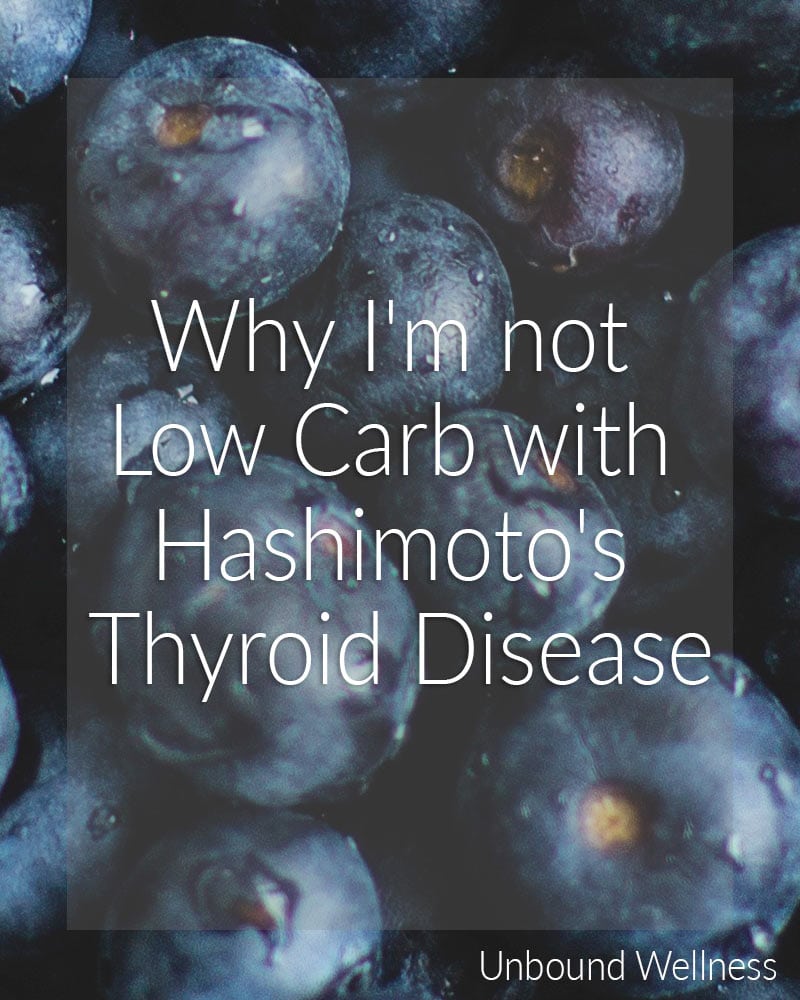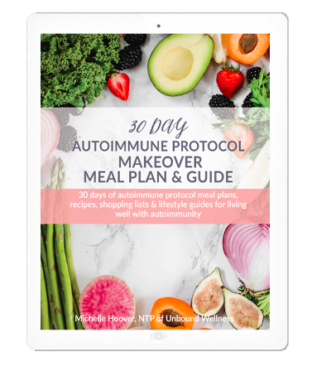Why I’m not Low Carb with Hashimoto’s Thyroid Disease
In the midst of the low-fat revolution mostly dying down, there’s a newer kid on the block… low-carb. It’s said to be miraculous for weight loss, sustained health, long term healing, and blood sugar control. More and more people are dropping gluten, grains, and jumping on the paleo bandwagon while more brands are labeling their foods and menu items as “low-carb”. With weight gain being such a prevalent symptom of hypothyroidism and Hashimoto’s disease, it sounds like a low-carb diet is the perfect remedy right? I’m not super low carb with Hashimoto’s thyroid disease… I don’t necessarily believe that everyone should be either.
I know that you read and hear the same things that I do… “low-carb” is healthy, it’s natural, it’s an amazing way to lose weight, and so forth. I also know what it feels like to be unhealthy and carry extra weight with Hashimoto’s. The desire to just be normal and be at a natural weight is so strong. I’ve felt it and I know you do too. However, I assure you that there are others way to heal your thyroid, and deal with weight gain and low carb is not one of them for the bulk of us.
But, what about our paleo ancestors? Didn’t they eat low carb? So shouldn’t we regardless of our thyroid disease? Yes and no. Yes, our paleo ancestors were low carb in the sense that they didn’t have an abundance of bags of sweet potatoes from Trader Joe’s at their beckon call. No, those of us with thyroid disease should not avoid carbs just to match what we believe that our ancestors ate in hopes that it will restore us to that health.
If you’ve tried a too low carb diet before and you have Hashimoto’s, you can most likely agree with me when I say, I felt terrible. I was tired, and it wasn’t sustainable for me to go high fat and super low carb long term.
It’s true that many people have success with low carb diets and that’s fine. We’re all bioindividuals and we have to do what works for us. Many people find a lot of success of high fat low carb, but many people don’t. Regardless, I’m tired of real food carbs like fruits and vegetables being demonized, so I’m sharing why I am not super low carb.

1.Carbs are needed to convert T4 to T3.
If you’re like me and have thyroid disease, you probably know what your last blood test said about your T4, and T3. But, what does it mean? T4 is the unusable thyroid hormone that needs to be converted to T3 for you thyroid to properly function. However, for this conversion to happen your body needs glucose, which are derived from carbohydrates.
You need to consume carbohydrates for you body to make this conversion. Without consuming an adequate amount of healthy carbs, your body will struggle to do this conversion or just not do it. In turn, this only throws off your thyroid function even more.
2. Carbs are necessary for proper hormone function and metabolism.
Along with the T4 to T3 conversion, carbs help balance other hormones in the body as glucose supports the hormone conversion, and your bodies ability to regulate metabolism. Think of your hormones as a cascading process in the body that are all closely related. When one thing is thrown off, it throws off the entire delicate balance of your hormones. Poorly regulated hormones only create more problems for those with thyroid disease, which is often the last thing that we need.
This disregulated hormone function can manifest in the following…
- Lost or missed periods
- Painful or irregular menstrual cycles
- Mood swings
- Insomnia
- etc.
3. Carbs are needed for energy.
One of the main functions of carbohydrates in the body is a quick source of energy. Carbohydrates start metabolizing and digesting as soon as we start chewing on them. They provide quick energy that the body can use immediately without having to process.
Doesn’t fat provide more sustained energy? Well, yes. However, a balanced ratio of fat and carbohydrates provides both energy and a more sustainable lifestyle, which is another huge factor…
4. Low carb diets are stressful on the body and the adrenals.
Adrenal fatigue, stress, and exhaustion can often go hand and hand with thyroid disease as it all relates to poorly managed stress and hormone production. Though adrenal fatigue is mostly caused and healed by lifestyle factors, carb intake is a huge factor.
Seeing as carbs are needed for energy and hormone conversions in the body, a lack of carbs is inherently stressful. It tires the body out, and doesn’t allow the adrenals to heal or the body to be at homeostasis.
5. Carbs are not evil.
We have this tendency to make food either good or bad. Either you can eat something, or you should avoid it like the plague… there’s no middle ground. However, that’s simply not the case when it comes to real food. Carbs are not all bad, all carbs do not make you fat, and low-carb is not required for sustained health and weight loss. French fries, crackers, and processed breads are bad, yes, of course. However, just because these things are classified as carbs do not make roots, tubers, fruits, and starchy vegetables bad.
6. It’s more sustainable and less “diet-y” to just eat a balanced diet rather than avoid carbs..
There are a few exceptions to the low carb dieting where I believe that it can be beneficial for a short period of time, such as:
- Correcting blood sugar regulation
- Gut healing protocol like GAPS or a candida management protocol
However, the keyword here is short time period.
Thyroid disease is indeed manageable and plenty of people have put their Hashimoto’s into remission, the lifestyle that promotes that healing is for life. To support long term healing, it’s crucial to build a healing plan that can sustain you for life. Low-carb dieting can easily turn into just another diet that is not as easily sustainable for long term.
This varies from person to person, but generally speaking, low-carb is less sustainable than a balanced diet.
How do you know that you may be too low carb?
With thyroid disease, it can be challenging to asses what is actually ailing you. The list of symptoms are massive, and finding a root to each one can be impossible. However, here are just a few of the signs that you could be eating too low carb that you may want to pay more attention to…
- Low energy
- Inability to recover from exercise
- Sugar cravings
- Disregulated menstrual cycles
- etc.
So, how do you eat carbs healthfully?
You can over do it on carbs, or just eat the wrong kinds of carbs very easily.
- You need to balance your carb intake. Roughly 40% of your diet should be carbs, 30% fat, and 30% protein. This varies by activity level and need, but I recommend women with thyroid disease to start with at least 100 g of carbs a day.
- You need to chew your food and eat in a relaxed state. Remember when I said that carb digestion starts in the mouth? Well, it really starts with chewing and in the brain! You need to be relaxed and chew your food to digest carbs.
- You need to eat the right kind of carbs.
So, what are some healthy carbs that you can enjoy with Hashimoto’s thyroid disease? To just name a few…
- Vegetables
- Fruits (in moderation)
- Parsnip
- Carrot
- Winter Squash
- Rutabaga
- Sweet potato (can be irritating to some as they’re kind of estrogenic)
- Plantains
- Turnip
- Yuca
- etc.
What carbs should you avoid?
- Processed breads, crackers, breads, cakes, cookies, etc.
- Anything processed labeled “low-carb”
- Grains (be careful with these)
- Potatoes (be careful with these as well, as they are a nightshade that are inflammatory to many, but not all)
Where should you be careful?
- Overconsumption in general
- Flours, and starches (even gluten free and grain free)
- Processed grain free snacks
It takes time, diligence and practice to make peace with carbs and find your balance. If you have any questions about exactly how much you need, feel free to reach out!







Pingback: The Best Foods For Healing Hashimoto's Disease - Unbound Wellness
Do I ever agree!! I have Hashimoto’s and, my God, I almost died on a low carb diet. The ONLY one which worked for me was the 40/30/30 protocol. Yet, you have so many, including Isabelle Wentz (the pharmacist who is a reported expert on Hashimoto’s) claiming that Paleo/low carb is fine for those with Hashimoto’s. Not for this Hashimoto’s patient. Thank you Michelle for the validation.
You’re so welcome, Angelina! We are ALL different and it’s so important to respect and acknowledge bio-individuality!
What do you have to take along with cutting bad carbs ??
ok but I have been eating an extremely healthy diet for two years now, including removing all the foods I’m sensitive too. I work out 6 days a week, running and yoga and zero weight loss. I can’t describe the kind of hell this is bc I am about 20 pounds overweight compared to where i was before my hashimotos, PCOS and insulin resistance. I started low carb recently, because my amazing doctor put me on it. I can no longer eat grains of any kind. I feel amazing on a low carb diet, never had so much energy….and I’m starting to lose weight. If you are saying i shouldn’t go low carb against my doctors orders…who deals with hashimotos patients all the time….then what exactly should i be eating?
Amanda, we’re all bioidividuals and just because one approach works for me, doesn’t mean it works for you. I recognize and understand that there is not one size fits all and I’m only sharing my view and approach here. You should listen to your doctor and do what makes you feel best.
I believe the article clearly points out that some may do very well with low carb and you may be one of those. If you are battling with PCOS in conjunction with thyroid issues just like me please make sure your doctor is correctly dealing with your other hormones such as free testosterone, progesterone, etc. I have had the best results with grain free but i eat fruits and vegetables. I also take 2000mg Metformin and 300mg Spironolactone for my PCOS. I FINALLY after 30 years have my body under control hormonally! Best of luck to you. I had to switch to a functional medicine doctor to ever get well.
It is very difficult to get 100 grams of carbs by eating veggies and fruits without adding beans, rice, potatoes (grain-free foods). Dr Wenz pretty much says the exact same thing as this post. Any time you cut out processed carbs it’s considered low-carb but people with thyroid issues do need to pay attention to the grams per day. I’m convinced going Paleo totally screwed me up because I was not eating enough veggies and fiber.
Everyone is different for sure. For me, I find it very easy to get 100 grams of carbs from fruits and veggies, but I acknowledge that everyone is different.
I realize this thread is from years ago but I just wanted to say I also run, cycle, kickbox, yoga and strength train and didn’t lose any weight for almost 2 years after my diagnosis. I also continued to feel AWFUL despite religiously taking my medication. Since I started taking Vitamin D and Vitamin B (1,12 &6) I have energy again and I am much closer to my pre-Hashi’s weight (still 7 pounds more).
The carbs you list for being healthy are the same carbs that are in a low carb diet. So what’s the difference between your “diet” and a low carb such as a keto diet??
Vegetables
Fruits (in moderation)
Parsnip
Carrot
Winter Squash
Rutabaga
Sweet potato (can be irritating to some as they’re kind of estrogenic)
Plantains
Turnip
Yuca
etc.
The carbs you list to avoid are the same carbs that are in a low carb diet. So what’s the difference between your “diet” and a low carb such as a keto diet??
Processed breads, crackers, breads, cakes, cookies, etc.
Anything processed labeled “low-carb”
Grains (be careful with these)
Potatoes (be careful with these as well, as they are a nightshade that are inflammatory to many, but not all)
Parsnips, carrots, rutabaga and sweet potatoes are not generally considered low carb.
As someone who has been on a real Keto diet for epilepsy.. their are no fruit or vegetables, just per team and lots of fat and oil .. The modified Atkinson,once you get the phase 2 yes you can have some fruits and vegetables
True Keto eaters count ALL carbs including whole food carbs and they do NOT allow any of them over a certain amount! For some people, they allow zero carbs which means they eliminate all fruits and starchy veggies… that is how her diet is different…
I’ve done Atkins and I’ve done Weight Watchers. I loved Atkins for the food – bacon, tuna with regular mayo. Yummy! But losing weight was sooo slow, , I thought I’d lose my mind. Weight Watchers works like a charm for me. As you say, everyone is different.
Do you have a sample of what you eat on an average day? I have Hashimotos and I am extremely active. Fitness & dance has always been a part of my life. But I have been really struggling with finding the right diet that works for me to keep me from feeling sick and run down
Hi, Paulette. If you follow me on Instagram, I often share what I eat there, but it would be different from what you would need. I’m not super active every single day, so I would suggest working 1:1 with someone.
Everyone is different. I had to have my thyroid completely removed in 2004. Finding the right doctor is #1. Finding the right diet for you is #2. My body does not convert T4 to T3. I have to have T3. I have to be in NDT which doctors don’t like. I also have to eat low carb (30g or less a day) and I feel great! Find your balance and feel good. It’s your life. Everyone is different. Just because you are in the normal range of lab work…. don’t settle. Go for feeling great. You can do it. I know, because I did it and lost 40 of the 70 pounds I gained.
Thank you. Everyone keeps telling me to go Keto. First off I don’t eat enough and that needs to be my first change, second all that meat and fats are hard for my body to process. I am cutting back and buying “organic”. I read ingredients. Less processed, less ingredients I can’t pronounce and more simple foods. I try and make my own, like jelly, bread, salsa, sauce so I can control what goes into it.
I started the “keto” lifestyle change a few months ago. Before starting, my Dr’s had me on IBS medication, Narcolepsy medication due to no energy and sleeping 18hrs a day, a T3 medication and a T4 medication. I had even gained 30lbs this past year. I’m happy to say that I’m now off of the IBS and Narcolepsy medications and the T3 and T4 have been lowered to the lowest dose available. I am able to work once again and also I have lost the 30lbs I had gained. I am back to my old self again. Low carb changed/saved my life. I agree, it’s not for everyone but it sure was for me
I’m glad you have success with it! I agree many people do well with it, and I’m glad that you do… those are life changing results. but I just like to share the other side 🙂
I can’t quite go low carb like I used to. It doesn’t work with my hashimotos either. I do benefit from changing my carbs though. I do modified autoimmune Paleo with more fruit.
Full Gaps is NOT low carb. I know since my husband has done it for years to heal and manage Chrons disease 🙂
Thank you for this! I went low-carb to zero carb (through slow reduction of carbs) over a one month period and I have never felt sicker. I went on vacation and I had already decided that was when I would go off of the diet my doctor put me on to see if it made a difference. The first thing I ate was pizza. The moment I started eating it, I started feeling better. My fatigue, nausea, joint pain all went away that day.
My endo recommended that I go on a low-carb diet (not fully keto of course but to be mindful of my carb intake), and I find that it’s really all about finding balance and not completely cutting out food groups but just having them less often. I can’t imagine not having rice or potatoes every once in a while!
How many carbs do you eat?
It depends… I don’t track macros so I don’t have a number.
I eat all of those healthy cabs but my T3 free very low and total T3 also. I do not eat grains or sugar and cannot find a way to increase my T3. How did you increase your T3 levels with your carb diet? I also don’t handle nuts or grains well at all. How can I get 100+ grams of carbs per day?
Hi Mike, I would highly recommend working with a functional medicine doctor who can help give you advice based on your body’s specific needs as every body is different. I have a blog post that will help you find a good doctor in your area to work with!